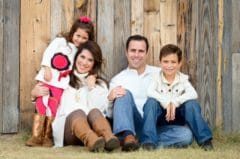Matt, Follicular Lymphoma Survivor
My wife dragged me to her general physician because I had a lump on my throat,
The results of the needle-point biopsy came back. The ENT said, “It’s either going to be mononucleosis or lymphoma.” I had never heard of lymphoma, and I already had mononucleosis. I was always under the impression you could only have mono once in your life. The doctor told me that with most the cases that’s true. Once he said that, I kind of knew that I had lymphoma. We did a full biopsy of a lymph node under my neck. On December 15, 2010, it was determined that I did, in fact, have non-Hodgkin follicular lymphoma.
“I was only 36, still in good health, still going to the gym every day of the week.”
We scheduled a series of other tests—an EKG and a bone marrow biopsy. The bone marrow biopsy showed that I had some cancer in the bone marrow. Not a lot but some. And it was recommended to go see an oncologist. As you can imagine, the emotions going through my mind were of panic, a little depression, a little anger of why this is happening to me, and some confusion because I really don’t know what I did to deserve to have cancer. I work out seven days a week, I played soccer my whole life, I ate well, and I take care of myself; so, you know, what did I do wrong here?
During my first visit with an oncologist, he wanted to start me on chemotherapy and rituximab (Rituxan)-cyclophosphamide, doxorubicin, vincristine, and prednisone (R-CHOP) that next day. I said, “Tap the brakes, doc. You’re the first doctor I’ve seen, but no offense, I’m going to get different opinions.” I ended up seeing a total of four oncologists. I went to one of the Ask the Doctor programs hosted by the Lymphoma Research Foundation (LRF), and I really liked the speaker. So, I made an appointment with him and ended up choosing him as my oncologist.
“The emotions going through my mind were of panic, a little depression, a little anger of why this is happening to me.”
When all of this is happening at first, one of the biggest points of confusion is all of the resources that are out there. You’re on the Internet, you don’t know what to believe, and then you talk to other people and they know just a small percentage of what lymphoma is, and so you get more confused. Then you go see doctors who are supposed to be the experts. One doctor is telling you to do R-CHOP, one doctor is telling you radioimmunotherapy, another doctor is saying, “watch and wait.” And really, it’s very confusing, and all the while you are just trying to make one of the most important decisions that you have to in your lifetime.
At the time, I was only 36, still in good health, didn’t feel bad, still going to the gym every day of the week, so I chose the treatment that had the least amount of toxicity. I have two small children; I didn’t want them see me suffer, or see me have the effects of what chemotherapy can do. So, I decided to go with just a treatment of rituximab only. I don’t regret it one bit because four months after treatment, I had my first scan and it came back clean with no evidence of disease. As of July 8, 2011, I was in remission. I’m still continuing treatments once every two months and have another year’s worth. Then I’ll go on to watch and wait.
I’d recommend that patients get involved with LRF at some level. They do many things to help patients. The “Ask the Doctor” program is a wonderful program. I wouldn’t have found my doctor without it. It really gives people, who aren’t as educated about the disease or haven’t done the research yet, an easy setting to ask questions. And they can hear other people’s questions that they may have not known to ask.
“I always share with patients to just make sure they have a very strong support team.”
Each year I participate in the Dallas Lymphoma Walk. Also, I was asked to be on the Inaugural Ambassadors Program, which is where I speak on behalf of LRF-talking to people who are newly diagnosed or who have questions, or speaking in a public forum.
I always share with patients to just make sure they have a very strong support team. I encourage them to talk about it, because the more I talk about it, I feel my friends and family are less uncomfortable. I’ll volunteer the information versus them not being sure how to act around me. Again, everyone’s wired differently, but that’s how I think I’ve been able to deal with it pretty well.
